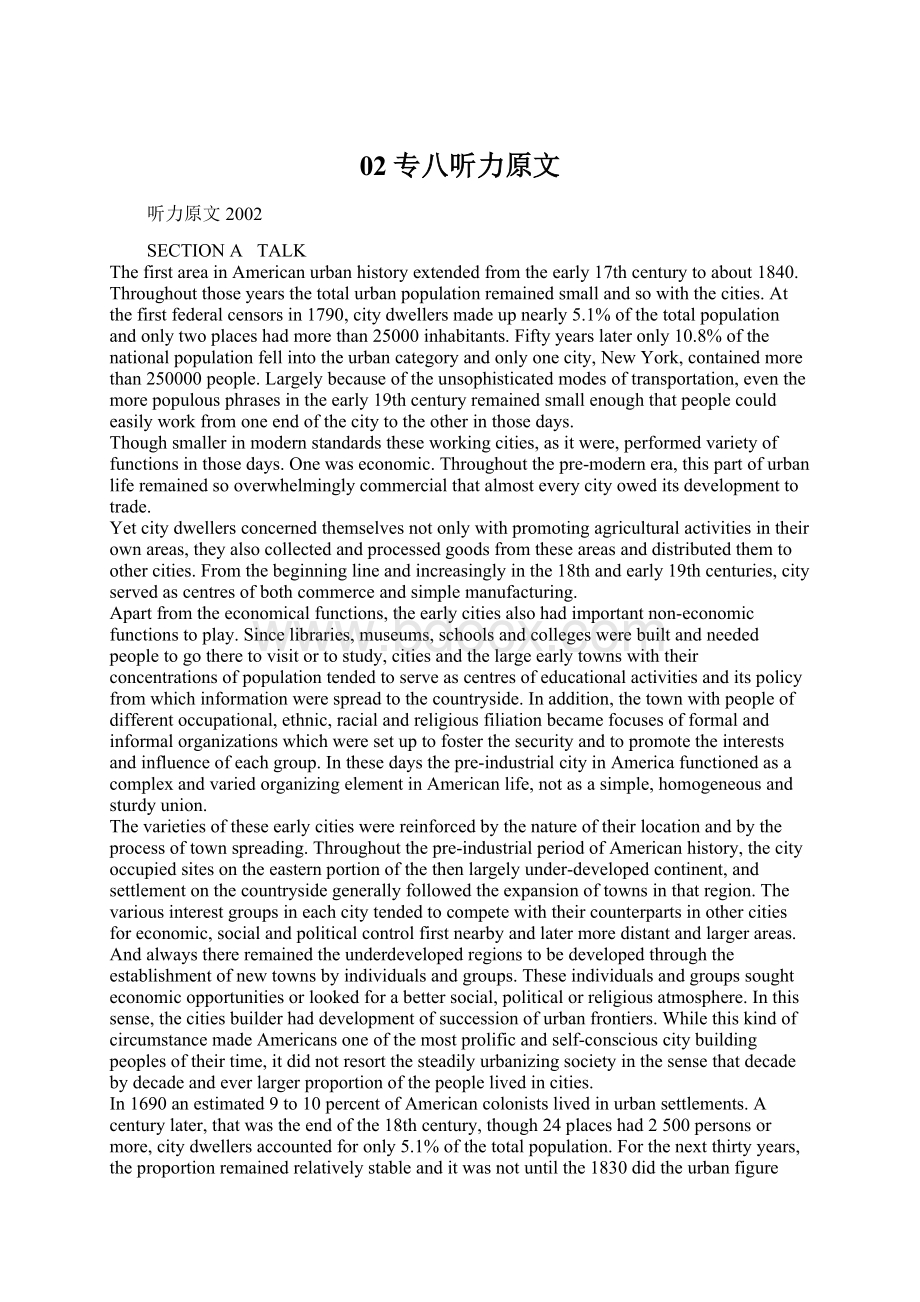02专八听力原文.docx
《02专八听力原文.docx》由会员分享,可在线阅读,更多相关《02专八听力原文.docx(5页珍藏版)》请在冰豆网上搜索。

02专八听力原文
听力原文2002
SECTIONA TALK
ThefirstareainAmericanurbanhistoryextendedfromtheearly17thcenturytoabout1840.Throughoutthoseyearsthetotalurbanpopulationremainedsmallandsowiththecities.Atthefirstfederalcensorsin1790,citydwellersmadeupnearly5.1%ofthetotalpopulationandonlytwoplaceshadmorethan25000inhabitants.Fiftyyearslateronly10.8%ofthenationalpopulationfellintotheurbancategoryandonlyonecity,NewYork,containedmorethan250000people.Largelybecauseoftheunsophisticatedmodesoftransportation,eventhemorepopulousphrasesintheearly19thcenturyremainedsmallenoughthatpeoplecouldeasilyworkfromoneendofthecitytotheotherinthosedays.
Thoughsmallerinmodernstandardstheseworkingcities,asitwere,performedvarietyoffunctionsinthosedays.Onewaseconomic.Throughoutthepre-modernera,thispartofurbanliferemainedsooverwhelminglycommercialthatalmosteverycityoweditsdevelopmenttotrade.
Yetcitydwellersconcernedthemselvesnotonlywithpromotingagriculturalactivitiesintheirownareas,theyalsocollectedandprocessedgoodsfromtheseareasanddistributedthemtoothercities.Fromthebeginninglineandincreasinglyinthe18thandearly19thcenturies,cityservedascentresofbothcommerceandsimplemanufacturing.
Apartfromtheeconomicalfunctions,theearlycitiesalsohadimportantnon-economicfunctionstoplay.Sincelibraries,museums,schoolsandcollegeswerebuiltandneededpeopletogotheretovisitortostudy,citiesandthelargeearlytownswiththeirconcentrationsofpopulationtendedtoserveascentresofeducationalactivitiesanditspolicyfromwhichinformationwerespreadtothecountryside.Inaddition,thetownwithpeopleofdifferentoccupational,ethnic,racialandreligiousfiliationbecamefocusesofformalandinformalorganizationswhichweresetuptofosterthesecurityandtopromotetheinterestsandinfluenceofeachgroup.Inthesedaysthepre-industrialcityinAmericafunctionedasacomplexandvariedorganizingelementinAmericanlife,notasasimple,homogeneousandsturdyunion.
Thevarietiesoftheseearlycitieswerereinforcedbythenatureoftheirlocationandbytheprocessoftownspreading.Throughoutthepre-industrialperiodofAmericanhistory,thecityoccupiedsitesontheeasternportionofthethenlargelyunder-developedcontinent,andsettlementonthecountrysidegenerallyfollowedtheexpansionoftownsinthatregion.Thevariousinterestgroupsineachcitytendedtocompetewiththeircounterpartsinothercitiesforeconomic,socialandpoliticalcontrolfirstnearbyandlatermoredistantandlargerareas.Andalwaysthereremainedtheunderdevelopedregionstobedevelopedthroughtheestablishmentofnewtownsbyindividualsandgroups.Theseindividualsandgroupssoughteconomicopportunitiesorlookedforabettersocial,politicalorreligiousatmosphere.Inthissense,thecitiesbuilderhaddevelopmentofsuccessionofurbanfrontiers.WhilethiskindofcircumstancemadeAmericansoneofthemostprolificandself-consciouscitybuildingpeoplesoftheirtime,itdidnotresortthesteadilyurbanizingsocietyinthesensethatdecadebydecadeandeverlargerproportionofthepeoplelivedincities.
In1690anestimated9to10percentofAmericancolonistslivedinurbansettlements.Acenturylater,thatwastheendofthe18thcentury,though24placeshad2500personsormore,citydwellersaccountedforonly5.1%ofthetotalpopulation.Forthenextthirtyyears,theproportionremainedrelativelystableanditwasnotuntilthe1830didtheurbanfiguremovedbackuptothelevelof1690.
Inshort,asthenumberofcitiesincreasedafter1690,theysentlargenumberofpeopleintocountrysideandtheyretained.Nonethelessthecontinuousmovementofpeopleintoandoutofthecitiesmadelifeinthemanybutrelativelysmallplaceslivelyandstimulating.
SECTIONB INTERVIEW
M:
I'mtalkingtoJanetHolmeswhohasspentmanyyearsnegotiatingforseveralwell-knownnationalandmulti-nationalcompanies.Hello,Janet.
W:
Hello.
M:
NowJanet.You'veexperiencedandobservedthenegotiationstrategiesusedbypeoplefromdifferentcountriesandspeakersofdifferentlanguages.Sobeforewecommentonthedifferences,couldIaskyoutocommentfirstofallonwhatsuchencountershaveincommon?
W:
OK,well,I'mjustgoingtofocusonthesituationswherepeoplearespeakingEnglishininternationalbusinesssituations.
M:
Isee.Now,noteveryonespeaksEnglishtothesamedegreeofproficiency.So,maybethataffectssituations.
M:
Yes,perhaps.Butthatisnotalwayssosignificant.Well,because,Imean,negotiationsbetweenbusinesspartnersfromdifferentcountriesnormallymeanwehavenegotiationsbetweenindividualswhobelongtodistinctculturaltraditions.
M:
Oh,Isee.
W:
Well,everyindividualhasadifferentwayofperformingvarioustasksineverydaylife.
M:
Yes,but.butisn'titthecasethatinthebusinessnegotiation,theymustcometogetherandworktogethertoacertainextent.Imean,doesn'tthatlevelupthestyleof,thestyleofdifferencesorsomewhat?
W:
Oh,1amnotsosure.Imeanthere'speopleintheso-calledWesternWorldwhosaythatincourseofthepast30or40years,therewerealotofthingshadchangedagreatdealglobally,andthatasaconsequence,nationaldifferenceshaddiminished.Wehavegotfewer,givingwaytosomesortofinternationalAmericanizedstyle.
M:
Yeah,I'veheardthat.NowsomepeoplesaythisAmericanizedstylehasactedasamodelforlocalpatterns.
W:
Maybeithas,maybeithasn't.Becauseontheonehand,theredoesappeartobeafairlyunifiedevenuniformstyleofdoingbusinesswithcertainbasicprinciplesandpreferences,youknow,like"timeismoney",thatsortofthing. Butatthesametime,itisveryimportanttorememberthewayallretainaspectsofnationalcharacteristics.Butitisactualbehaviorthatwewilltalkabouthere. Weshouldn'tbetooquicktogeneralizethattonationalcharacteristicandstylistictype.Itdoesn'thelpmuch.
M:
Yeah.YoumentionedAmericanizedstyle.WhatisparticularaboutAmericanstyleofbusinessbargainingornegotiating?
W:
Well.I'venoticedthat,forexample,whenAmericansnegotiatewithpeoplefromBrazil,theAmericannegotiatorsmaketheirpointsinadirect,sophisticalway.
M:
Isee.
W:
WhileBrazilianmaketheirpointsinamoreindirectway.
M:
How?
W:
Letmegiveyouanexample.Brazilianimporterslookatpeoplethey'retalkingtostraightintheeyesalot.Theyspendtimeonwhatsomepeoplethinkstobebackgroundinformation.Theyseemtobemoreindirect.
M:
Then,whatabouttheAmericannegotiators?
W:
Americanstyleofnegotiating,ontheotherhand,isfarmorelikethatofpoint-making,firstpoint,secondpoint,thirdpoint,andsoon.Nowofcourse,thisisn'ttheonlywayinwhichonecannegotiateandabsolutelynoreasonwhythisshouldbeconsideredasthebestwaytonegotiate.
M:
Right.Americansseemtohavedifferentstyles,say,evenfromtheBritish,don'tthey?
W:
Exactly,whichjustshowhowcarefulyoumustbeaboutgeneralizing.1mean,howaskingyouexplainhowtheAmericannegotiatorsareseenasinformal,andsometimesmuchtooopen.ForBritisheyes,Americansaredirectevenblunt.
M:
Isthatso?
W:
Yeah,atthesametime,theBritishtoo.Germannegotiatorscanappeardirectanduncompromisinginthenegotiations,andyetifyouexperienceGermansandAmericansnegotiatingtogether,itisoftentheAmericanswhoarebeingtoobluntfortheGermannegotiators.
M:
Fascinating!
SopeoplefromdifferentEuropeancountriesusedifferentstyles,don'tthey?
W:
That'sright.
M:
OK.SowhatabouttheJapanesethen?
Imean,istheirstyledifferentfromtheAmericansandEuropeans?
W:
Oh,well,yes,ofcourse.ManyEuropeansnoditsextremepolitenessoftheirJapanesecounterparts,thewaytheyavoidgivingtheslightestdefense,youknow.They'realsoveryreservedtopeopletheydon'tknowwell.AtthefirstmeetingsAmericancolleagueshavedifficultiesinfindingtherightapproachsometimes.ButthenwhenyoumeettheJapanesenegotiatorsagain,thisinitialimpressiontendstodisappear.ButitisperhapstruetosaythatyouraverageJapanesebusinesspersondoeschoosehisormorereallyherwordsverycarefully.
M:
Socanwesaythatwhatevernationalitiesyouaredealingwith,youneedtorememberthatdifferentnationalitiesnegotiateindifferentways?
W:
Well,it'sperhapsmorehelpfultobearinmindthedifferentpeoplebehavein negotiatingindifferentways.Andyoushouldn'tassumethateveryonewillbehaveinthesamewaythatyoudo.
M:
Right.Itisdefinitelyaveryusefultipforourbusinessmanwhooftennegotiatewiththeiroverseaspartners.OK,Janet,thankyouverymuchfortalkingwithus.
W:
Pleasure.
SECTIONC NEWSBROADCAST
NewsItemOne (ForQuestion11)
ThefirstInternationalTibetanTraditionalMedicineConferencewillbeheldJuly15thto17thinLasha,capitalcityofTibetautonomousregion.China'sEthnicMedicineInstitute,TibetanBureauandTibetanMedicalCollegewillco-hosttheconference.Theconferencehasreceivedmorethan500researchpapersfromChinaandabroad.Theorganizingcommitteeprimarilyselected290articlestobediscussedattheconference.Morethan50foreignguestsfromUnitedStates,Russia.Britain,India.Germany,France,ItalyandNepalwillattendthemeeting.TheChinesemainlandhassentdelegationconsistingof250Tibetanmedicineexpertstotheconference.
NewsItemTwo(ForQuestions12—13)
ThegovernmentoftheHongKongSpecialAdministrativeRegionwereactivelyadopt